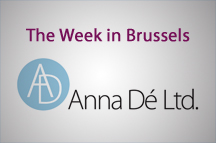 EU Anniversary: 25 years since Maastricht
EU Anniversary: 25 years since Maastricht
This week saw the 25th anniversary of the EU. It was on the 7th February 1992 that the Treaty of Maastricht was signed, paving the way for today’s EU and the Euro. Of course, such a milestone is somewhat overshadowed as the EU faces many challenges, most notably now with Brexit and the refugee crisis.
It’s a time of poignant reflection for the EU. Will the EU dream be rekindled or die?
The European Parliament’s lead Brexit negotiator, Guy Verhofstadt, said that it is 'an existential moment for the European Union' and warned that without reform it could disappear completely.
Brexit Bill and the other ‘Brexit bill’
In Westminster this week, MPs overwhelmingly agreed to let the government begin the UK's departure from the EU as they voted in favour of the Brexit bill. The draft legislation was approved by 494 votes to 122, and now moves to the House of Lords. Prime Minister Theresa May wants to trigger Article 50 of the Lisbon Treaty by the end of March.
Meanwhile, in Brussels, European Commission’s chief negotiator for Brexit, Michel Barnier, briefed the 27 remaining countries on the methodology it was considering to use to calculate how much the UK will owe, after it leaves the EU. Commentators are predicting a final ‘Brexit bill’ in the order of €60 billion.
Beyond Brexit related matters, it has been a busy week in Brussels on a whole range of issues.
Robots in the European Parliament
 Robots took over the European Parliament. They were the VIP guests at a seminar on creating rules and laws to regulate their use. MEPs will vote on a report on the civil use of robots, such as medical equipment and home robots, during next week's plenary in Strasbourg.
Robots took over the European Parliament. They were the VIP guests at a seminar on creating rules and laws to regulate their use. MEPs will vote on a report on the civil use of robots, such as medical equipment and home robots, during next week's plenary in Strasbourg.
Support and expertise of the human kind has been assembled by the European Parliament President Antonio Tajani. He shared details this week of each of his team member’s responsibilities. His cabinet has 32 staff members, with 14 nationalities represented.
Also in the European Parliament this week, a report was adopted by the Women's Rights Committee calling for the EU to take further action on gender equality. In the EU women still continue to earn less and receive lower pensions than men. According to the European Commission, it would take another 70 years for women to earn the same as men with the current pace of progress.
EU Member States pushed to speed up the relocation of refugees
First Vice President of the European Commission, Frans Timmermans, presented the latest assessment report on EU migration policy. In tough words, he warned that EU Member States may face penalties if they don’t take refugees. The European Commission will consider punishing countries by the time its next report on migration policy comes out next month, if they fail to share the burden of asylum seekers stranded in Greece and Italy.
Netflix and Spotify: full accessibility when away from home
 The EU came a step closer this week to making the digital single market a reality. As a result of the EU agreement reached, consumers will soon be able to fully access their online subscriptions for services like Netflix and Spotify when they travel around the EU. This will allow consumers to access their online content services when they travel in the EU in the same way they access them at home. The European Commissioner for Education, Culture, Youth and Sport, Tibor Navracsics, said: ‘Digital technologies provide new opportunities to enjoy cultural content on the go, and people are eager to use them. Today's agreement opens new doors to citizens while at the same time protecting creators and those investing in the production of cultural or sport content.’
The EU came a step closer this week to making the digital single market a reality. As a result of the EU agreement reached, consumers will soon be able to fully access their online subscriptions for services like Netflix and Spotify when they travel around the EU. This will allow consumers to access their online content services when they travel in the EU in the same way they access them at home. The European Commissioner for Education, Culture, Youth and Sport, Tibor Navracsics, said: ‘Digital technologies provide new opportunities to enjoy cultural content on the go, and people are eager to use them. Today's agreement opens new doors to citizens while at the same time protecting creators and those investing in the production of cultural or sport content.’
Environmental Implementation Review
The European Commissioner for Environment and Fisheries, Karmenu Vella, presented this week the Environmental Implementation Review (EIR). It is a new tool to improve the implementation of European environmental policy. The EIR package includes 28 country reports, a Communication summarising the political conclusions of the country reports and examining common trends, in areas such as air quality, waste management and the circular economy, water quality and protecting nature and biodiversity; and recommendations for improvements to all Member States.
Cancer Screening in the EU: encouraging developments
On the health front, the implementation report on the 2003 Council Recommendation on cancer screening was published this week. It reveals a steep rise in national screening programmes for breast, cervical and colorectal cancer. The European Commissioner for Health and Food Safety, Vytenis Andriukaitis said: ‘The Council's recommendation and the Commission's quality assurance guidelines have led to most EU countries putting in place organised, high quality screening programmes. This is a major step forward for citizens' health.’













